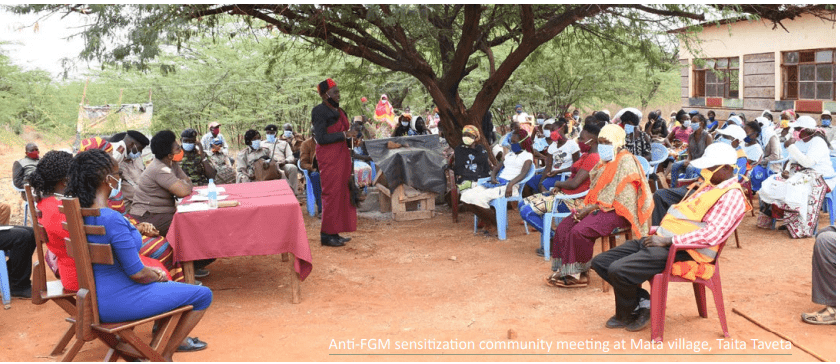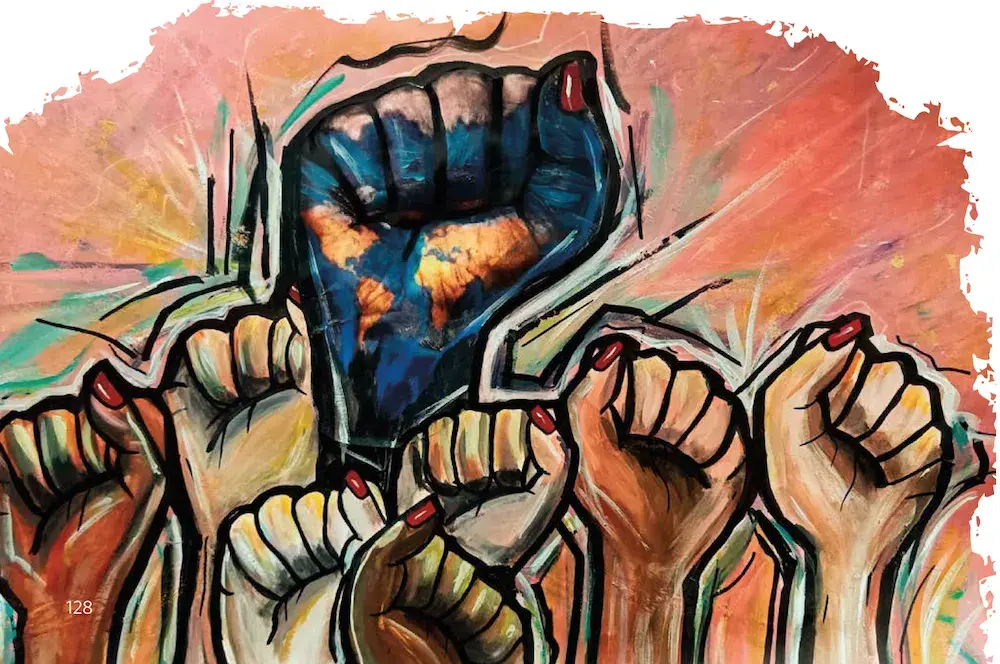It is Monday afternoon and the residents of Mata village in Taita Taveta County have gathered under a shade to avoid the scorching sun. Also, in attendance are county and national government officials led by the Chief Administrative Secretary in the Ministry of Public Service, Gender Rachel Shebesh as well as UNFPA Kenya officials led by UNFPA Representative Dr. Olajide Ademola. They all gaze as Habiba Suleiman, a midwife at Taveta Sub- County Hospital, explains a matter all so familiar to her heart. The pain is written all over her face, as she turns the opposite direction, to wade off the overwhelming emotions. ‘It is very painful when you see infants barely a week old are brought to the health facility in pain after undergoing Female Genital Mutilation (FGM).’ ‘Some have died due to excessive bleeding while scores of others have to grapple with health-related complications after being subjected to the harmful practice.’ Her sentiments are echoed by the CEC Gender Laban Mwashighadi who said that despite the enactment of the Prohibition of Female Genital Mutilation Act 2011, female genital mutilation (FGM) is still widespread in Taita Taveta County, with infants who are barely a-week old being cut behind closed doors, especially in rural areas. Findings The revelations appear to validate the findings of a recent study by the Ministry of Public Service and Gender which indicate that 61.3% of infants under the age of 5 years have been subjected to FGM in the County. In addition, 22 percent of children aged between 5-9 years and 11.1 percent of children aged between 10-14 years have been subjected to the cut. Areas listed as FGM hotspots in the county include Mata, Kitobo, Salaita, Timbila, Olkug, Ngutini, Eldoro and Marodo, all in Taveta Sub-County, while in Taita SubCounty the practice remains prevalent in Sagalla and Kasighau. In Kenya, FGM is illegal and carries a minimum punishment of three years in prison or a fine of not less than Ksh200,000 or both. Approach ‘We need to focus more on raising awareness on the dangers of FGM and challenging the ingrained ideas of the procedure as a cultural necessity.’ And this is what she has done in her bid to push for change. Popularly known in the community as Mama Najma, the medical practitioner frequents public meetings. Here, she spreads her tentacles and has become a fearless anti FGM crusader. Although the practice still continues unabated, she has made sure mothers and the community at large, are aware of the negative effects of FGM. ‘They are aware that FGM contributes to severe bleeding and health issues including cysts, infections, infertility as well as complications at childbirth and increases the risk of newborn deaths. In addition, women have longer, riskier deliveries, which can result in tearing during Anti-FGM sensitization community meeting at Mata village, Taita Taveta At first, she says she faced resistance from the community which highly regards the conservative norm. ‘But this only served to strengthen her resolve. She began to engage anti FGM activists and with support from the United Nations Population Fund (UNFPA), they have become a force to reckon with in the fight against retrogressive vices in the community,’ she explains during the interview. Turnaround ‘Together, we have continued to speak for the voiceless and inspire the people to discard cultural practices that reinforce barriers to behavioral change. The midwife takes credit for training young girls to become agents of change and break the cycle of destructive cultural practices. Today Suleiman works with the community to protect infants, support girls and enforce laws to make sure violations are adequately addressed. She is upbeat that the new directive by the Chief Administrative Secretary in Ministry of Public Service and Gender Rachel Shebesh, that all children visiting health facilities in the County must be subjected to health checks to establish if they have undergone the cut, will yield better returns. ‘This is a huge milestone in the Anti- FGM campaign and will make it easier for medical practitioners to hold abusers to account.’ Shebesh issued the directive as she toured of Kimala, Mata and Bura Ndogo villages which have been listed as areas with high prevalence of FGM in the county. The tour was in pursuant of revelations by leaders in the county that perpetrators had changed tact and were now targeting infants, a trend that had resulted in countless deaths and contributed to the rising prevalent rate. The Chief Administrative Secretary was emphatic that parents of the affected children will face the full force of the law. Further chiefs and their assistants will not be spared in the on-going crackdown to stem the vice. The chiefs were also directed to ensure that they visit households in which infants have been born and follow up to ensure their safety. And security. At the hospitals, the CAS also tasked the health personnel to check children when they are taken for immunization to verify if they have been cut. Furthermore, the law was also read to the communities implying offences and penalties applicable to the perpetrators. The Chief Administrative Secretary asked security officials, chiefs and village elders to identify culprits and hand them over for prosecution, adding that ignorance is not an excuse to break the law. In a separate interview, the UNFPA country representative Dr Ademola Olajide stated that the agency is working closely with the relevant government institutions both at the County and national levels to address the issue of GBV and harmful practices which have found a way to creep back because of the COVID response
Who we are
What we do
Perpetrators of female genital mutilation turn to infants in Taita Taveta
News
Perpetrators of female genital mutilation turn to infants in Taita Taveta
04 August 2020

Related Content
Remote video URL



